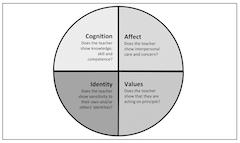Building Trust in the Classroom: A Conceptual Model for Teachers, Scholars, and Academic Developers in Higher Education
DOI:
https://doi.org/10.20343/teachlearninqu.11.20Keywords:
trust, university teaching, conceptual modelAbstract
The quality of student-teacher classroom interactions is important to learning, belonging, and success, particularly for students from groups that have been historically excluded from or marginalized in higher education. The literature commonly asserts that one necessary part of high-quality educational interactions (whether in person or online) is trust, but several scholars note that trust has not been systematically explored by scholars of higher education teaching and learning. In this paper, we propose a conceptual framework for identifying and describing teacher-initiated “trust moves” in the classroom, based on both the literature and interviews with teaching faculty in varied contexts. In doing this, we hope to provide a practical resource for teachers to reflect on possible approaches for building trust with students in their own classrooms—and for scholars and academic developers who wish to study or support these efforts.
Click here to read the corresponding ISSOTL blog post.
References
Beltrano, Natalie R., Beth Archer-Kuhn, and Stacey MacKinnon. 2021. “Mining for Gold and Finding Only Nuggets: Attempting a Rapid Systematic Review, on Trust in Higher Education IBL Classrooms.” Teachers and Teaching 27 (1–4): 300–15. https://doi.org/10.1080/13540602.2021.1955672.
Carless, David. 2012. “Trust and its Role in Facilitating Dialogic Feedback.” In Feedback in Higher and Professional Education, edited by David Boud and Elizabeth Molloy, 90–103. Routledge.
Cavanagh, Andrew J, Xinnian Chen, Meghan Bathgate, Jennifer Frederick, David I. Hanauer, and Mark J. Graham. 2018. “Trust, Growth Mindset, and Student Commitment to Active Learning in a College Science Course.” CBE—Life Sciences Education 17 (1): ar10.
Chew, Stephen L., and William J. Cerbin. 2021. “The Cognitive Challenges of Effective Teaching.” The Journal of Economic Education 52 (1): 17–40. https://doi.org/10.1080/00220485.2020.1845266.
Cooperrider, David. 2017. “The Gift of New Eyes: Personal Reflections After 30 Years of Appreciative Inquiry in Organizational Life.” Research in Organizational Change and Development: 81–142.
Eddy, Sarah L., Sara E. Brownell, Phonraphee Thummaphan, Ming-Chih Lan, and Mary Pat Wenderoth. 2015. “Caution, Student Experience May Vary: Social Identities Impact a Student’s Experience in Peer Discussions.” CBE—Life Sciences Education 14 (4): ar45. https://doi.org/10.1187/cbe.15-05-0108.
Felten, Peter, and Leo M. Lambert. 2020. Relationship-Rich Education: How Human Connections Drive Success in College. Baltimore, MD: JHU Press.
Gibbs, Paul. 2018. “Trust in the University.” In The Idea of the University: Contemporary Perspectives, Volume 2., edited by Ronald Barnett and Michael A. Peters, 412–31. Peter Lang.
Graff, Gerald, Cathy Birkenstein, and Cyndee Maxwell. 2014. They Say, I Say: The Moves that Matter in Academic Writing. Gildan Audio.
Hagenauer, Gerda, and Simone E. Volet. 2014. “Teacher–Student Relationship at University: An Important Yet Under-Researched Field.” Oxford Review of Education 40 (3): 370–88. https://doi.org/10.1080/03054985.2014.921613.
Jones, Gareth R., and Jennifer M. George. 1998. “The Experience and Evolution of Trust: Implications for Cooperation and Teamwork.” Academy of Management Review 23 (3): 531–46.
Kara, Elif, Mirco Tonin, and Michael Vlassopoulos. 2021. “Class Size Effects in Higher Education: Differences across STEM and Non-STEM Fields.” Economics of Education Review 82: 102104. https://doi.org/10.1016/j.econedurev.2021.102104.
Kezar, Adriana, and Dan Maxey. 2014. “Faculty Matter: So Why Doesn’t Everyone Think So?” Thought & Action 30: 29–44.
Ludema, James D., David L. Cooperrider, and Frank J. Barrett. 2006. “Appreciative Inquiry: The Power of the Unconditional Positive Question.” In Handbook of Action Research, 155–65.
Macfarlane, Bruce. 2009. “A Leap of Faith: The Role of Trust in Higher Education Teaching.” Nagoya Journal of Higher Education 9 (14): 221–38. http://citeseerx.ist.psu.edu/viewdoc/download?doi=10.1.1.491.8594&rep=rep1&type=pdf.
Mayer, Roger C., James H. Davis, and F. David Schoorman. 1995. “An Integrative Model of Organizational Trust.” The Academy of Management Review 20 (3): 709–34. https://doi.org/10.2307/258792.
Mayhew, Matthew J., Alyssa N. Rockenbach, Nicholas A. Bowman, Tricia A.D. Seifert, and Gregory C. Wolniak. 2016. How College Affects Students: 21st Century Evidence that Higher Education Works, Volume 1. San Francisco: John Wiley & Sons.
McKnight, D. Harrison, and Norman L. Chervany. 2001. “What Trust Means in E-commerce Customer Relationships: An Interdisciplinary Conceptual Typology.” International Journal of Electronic Commerce 6 (2): 35–59.
Payne, Ameena L., Cathy Stone, and Rebecca Bennett. 2022. “Conceptualising and Building Trust to Enhance the Engagement and Achievement of Under-Served Students.” The Journal of Continuing Higher Education: 1–18. https://doi.org/10.1080/07377363.2021.2005759.
Pedersen, Daphne E., Alena Kubátová, and Rebecca B. Simmons. 2022. “Authenticity and Psychological Safety: Building and Encouraging Talent Among Underrepresented Students in STEM.” Teaching & Learning Inquiry 10. https://doi.org/10.20343/teachlearninqu.10.31.
Simon, Eszter, and Gabriela Pleschová. 2021. “PhD Students, Significant Others, and Pedagogical Conversations. The Importance of Trusting Relationships for Academic Development.” International Journal for Academic Development 26 (3): 279–91. https://doi.org/10.1080/1360144X.2021.1949324.
Tierney, William G. 2006. “CHAPTER TWO: The Grammar of Trust.” Counterpoints 308: 41–57.
Tormey, Roland. 2021. “Rethinking Student-Teacher Relationships in Higher Education: A Multidimensional Approach.” Higher Education 82 (5): 993–1011.
West, Kim, and Candace Bloomquist. 2015. “Poetic Re-Presentations on Trust in Higher Education.” Canadian Journal for the Scholarship of Teaching and Learning 6 (2): 5.

Downloads
Published
Issue
Section
License
Copyright (c) 2023 Peter Felten, Rachel Forsyth, Kathryn A. Sutherland

This work is licensed under a Creative Commons Attribution-NonCommercial 4.0 International License.






